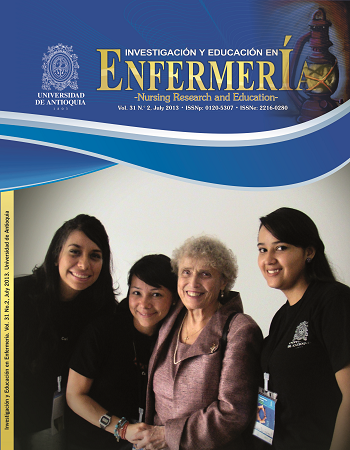Nursing care from the ethics of care and of gender.
DOI:
https://doi.org/10.17533/udea.iee.12105Keywords:
Ethics, nursing; nursing care; gender identity.Abstract
Objective. To explore the ethical dimensions of the concept and application of care from a gender perspective, in female and male nurses from a public hospital in the southern zone of Chile.
Methodology. Qualitative research was conducted using the case study methodology. Semi-structured interviews were made, between December 2011 and January 2012, of 11 nursing professionals (six women and five men) belonging to Hospital Base in the city of Valdivia, Chile. The data obtained and transcribed were read and coded to establish categories of meaning. Thematic analysis was performed from the statements.
Results. A marked service vocation and motivation was observed to apply care, both in men as in women, emphasizing on the psychosocial sphere of patients. Additionally, commitment and application of values were verified in the care giving practice, recognized as part of the excellence of the nursing professional, which they perceive as a characteristic aspect of the profession.
Conclusion. Nursing care is not exclusive of the female sex. Males and females develop an ethical sense of care closely linked to the vocational aspects.
Downloads
References
(1) Marriner A, Raile M. Modelos y teorías en Enfermería. Sexta ed. Barcelona: Elsevier; 2007.
(2) Hernández A, Guardado C. La Enfermería como disciplina profesional holísitica. Rev Cubana Enfermer. 2004; 20:1-1.
(3) Real Academia Española. Diccionario de la lengua española. 22nd ed. Madrid: Espasa Calpe; 2001.
(4) Garzón N. Etica profesional y teorías de Enfermería. Aquichán. 2005; 5:64-71.
(5) Romero E, Gutierrez M. La idea de responsabilidad en Levinàs: implicancias educativas. In: XII Congreso Internacional de teoría de la educación. Barcelona: Universitat de Barcelona; 2011. p.1-12.
(6) Tangyin K. Reading Levinas on Ethical Responsibility. In: Kwan T, editor. Responsibility and Commitment. Eighteen Essays in Honor of Gerhold K. Becker.Waldkirch: Edition Gorz; 2008.
(7) Jiménez JL. La dignidad de la persona humana. Bioética. 2006; 6:18-21.
(8) Pose C. Bioética de la responsabilidad. 1st ed. Madrid: Editorial Triacastela; 2012.
(9) Nilsson K, Larsson US. Conceptions of gender--a study of female and male head nurses' statements. J Nurs Manag. 2005;13:179-186.
(10) O'Lynn C. History of men in nursing: A review. In: O'Lynn C, Tranbarger R, editors. Men in nursing: history, challenges, and opportunities. New York: Springer Publishing Company; 2006.
(11) Evans J. Men nurses: a historical and feminist perspective. J Adv Nurs. 2004; 47(3):321-8.
(12) Feito L. Aspectos filosóficos de la relación entre las mujeres y la bioética: hacia una perspectiva global. In: De la Torre FJ, Editor. Mujer, mujeres y bioética. Madrid: Universidad Pontificia Comillas; 2010.
(13) Kohlberg L. Psicología del desarrollo moral. Bilbao: Descleé de Brouwer; 1992.
(14) Gilligan C. In a different voice: psychological theory in wowen's development. United States of America: Harvard University Press; 1993.
(15) Gilligan C. La moral y la teoría. Psicología del desarrollo femenino. México: FCE; 1985.
(16) Yin RK. Case Study Research: Design and Methods. Thousand Oaks, CA.: SAGE Publications; 2003.
(17) Stake R.E. Case studies. In: Denzin K, Lincoln S, editors. Handbook of qualitative research. 2nd ed. Thousand Oaks, CA.: SAGE Publications; 2000.
(18) Creswell JW. Qualitative Inquiry and Research Design: Choosing among Five Traditions. 2nd ed. London: SAGE Publications; 1998.
(19) Rubin HJ, Rubin IS. Qualitative Interviewing. The Art of Hearing Data. 2nd ed. California: SAGE Publications; 2004.
(20) Busquets M. La ética del cuidar. In: V Congreso Nacional de Enfermería en Ostomías. Pamplona: Sociedad Española de Estomaterapia; 2004. p. 27-34.
(21) Stott A. Exploring factors affecting attrition of male students from an undergraduate nursing course: a qualitative study. Nurse Educ Today. 2007; 27(4):325-32.
(22) Whittock M, Leonard L. Stepping outside the stereotype. A pilot study of the motivations and experiences of males in the nursing profession. J Nurs Manag. 2003; 11(4):242-9.
(23) de Souza M, de Bona VV, Coelho de Souza MI, do Prado ML. O Cuidado em Enfermagem: uma aproximação teórica. Texto Contexto Enferm. 2012;14 (2):266-70.
Additional Files
Published
How to Cite
Issue
Section
License
Derechos de propiedad / Direitos de Propriedade
English: If the article is accepted for publication, all copyright will be of exclusive property of Investigación y Educación en Enfermería. The text and the graphics included in the publication are exclusive responsibility of the authors and not necessarily reflect the thought of the Editorial Committee.
Español: Si el artículo es aprobado para publicación, todos los derechos son de propiedad de Investigación y Educación en Enfermería. El texto y las gráficas incluidas en la publicación son de exclusiva responsabilidad de los autores y no necesariamente refleja el pensamiento del Comité Editorial.
Português: Se o artigo for aceito para publicação, todos os direitos autorais serão de propriedade exclusiva de Investigación y Educación en Enfermería. O texto e os gráficos incluídos na publicação são de responsabilidade exclusiva dos autores e não refletem necessariamente o pensamento do Comitê Editorial.















